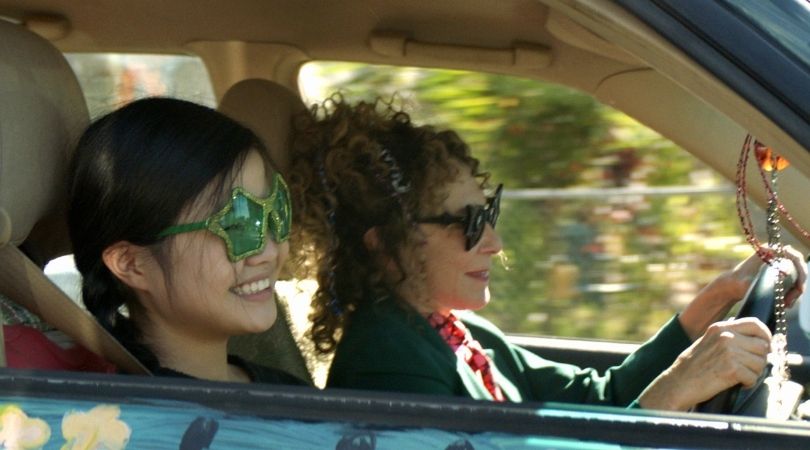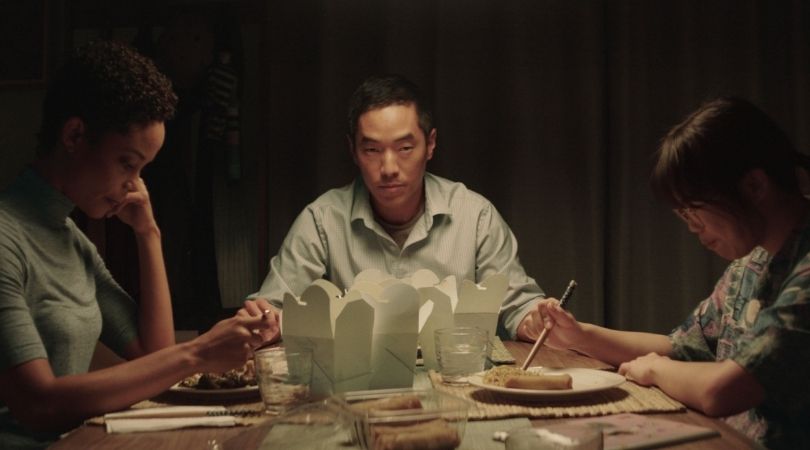
13 is a difficult age for any teenager. It’s a time we excitedly looked forward to as pre-teens because being called a “teenager” is seen as a right of passage to the life of being a cool young adult. With the new title of “teenager” comes new pressures never anticipated and for Sammy Ko (Miya Cech) that meant the crushing grief over the loss of her mother, and feeling as though no one else understood her. Recently screened at the 2021 Sundance Film Festival, Marvelous and The Black Hole was written and directed by Kate Tsang, who’s won multiple awards for her short films.
Marvelous and The Black Hole is a not so typical coming of age story in the way it uses magic and tales to create a pathway for Sammy to begin coping with the emotions swirling within her. For Sammy (Miya Cech) the way she’s tried to communicate has done nothing but create more tension. The rage and frustration she feels are released through verbally lashing out at her family, breaking things, and marking her skin with black Xs. In her father Angus (Leonardo Nam) and older sister Patricia (Kannon), Sammy sees targets for her hurt. She screams, curses, and throws tantrums with the slightest provocation. She’s unable to understand why and how her father is able to have a new relationship with his girlfriend Marianne (Paulina Lule). To this confused young girl, her sister’s ability to talk with friends, enjoy school and spend time playing games online is proof their mother’s death hasn’t created any significant impact. That Sammy is the only one still grieving.
When Sammy comes home with a black eye after getting in a fight at school, Angus becomes frustrated and disappointed at both his daughter and himself. He thinks that if he had been more strict with Sammy, as his parents were with him, maybe she wouldn’t be acting out now. He believes if he had disciplined her, Sammy’s grades wouldn’t be in constant decline and she would’ve gotten better during counseling. At his wit’s end, Angus gives her an ultimatum, either attend an adult college entrepreneurship course or go to a summer camp for children with behavioral issues.
Not wanting to go to the camp as she thinks it’s as a place for uncool kids, Sammy promises she’ll attend the class, but her vow of maintaining perfect attendance is broken as quickly as her moods switch. After coming up with an idea for a store where customers would pay to break things is said to be financially unfeasible, Sammy insults the professor, the other students and storms out. Fuming mad and muttering to herself she goes to the bathroom where she’s questioned about the bruise on her face. As to be expected, she brags about beating three students and rudely dismisses the woman. Later she runs into the lady again when the professor goes looking for her. The lady covers for Sammy and introduces herself as Margot (Rhea Pearlman), who works with kids in the college’s daycare.
Observing that Sammy doesn’t want to be in the class, Margot convinces her to be her magician’s assistant. Overtime Margot gradually grows closer to Sammy. Her happy go lucky personality proves to be the perfect foil for the teenager’s belligerent attitude, as she never takes the bait when Sammy acts out, managing to throw her off-kilter and effectively causing her anger to fizzle out. Just like a neat magic trick. Since her mother’s death, Sammy found it difficult to connect with people, but with Margot, it becomes easy because Margot herself has been living with grief after experiencing a traumatic loss as a child also. She gets Sammy to see that just because her family is moving on with their lives doesn’t mean they haven’t and aren’t still grieving.
Margot having no connection to the Ko family is able to look at the situation objectively, and through her special way of using magic tricks, and posing questions, she shows Sammy that just because Angus and Patricia aren’t immersed in their grief the way Sammy has been, doesn’t mean they’re not hurting too. Realizing that she’s been improving, Angus and Patricia do what they can to reach out to Sammy. In small ways, they try to show her that she’s not alone in her grief and no matter what happens, their mother would never be forgotten. For Sammy, one of the few tangible things she has left of her mother are stories recorded on cassette tapes. At night she listens to them as a way of staying connected to the person who means so much to her. One of the best parts of the film is how Tsang shows the viewer the way Sammy visualizes these stories, and her imagination when she becomes inspired by Margot’s magic.
With all of the positive things I have and can say about the film, there are negatives that I must mention as they affected how I saw it from the perspective of a Black woman. As mentioned one of the aspects of the film that makes it so interesting is the bringing to life of Sammy’s imagination, which is nice to see when she’s picturing herself riding a giant rabbit. However, what isn’t so nice is the extremely violent imagery of Sammy picturing herself killing Marianne. It was very disturbing for me to see this young girl imaging herself brutally cutting a Black woman – her father’s love interest – in half. Sammy’s visceral hate towards this innocent woman because she sees her as an interloper, bothered me.
This being a set up as a magician’s trick doesn’t erase the fact we’re seeing a child enacting violence on a Black woman who has never done them any harm. That there are two separate scenes where this occurs makes it doubly disturbing for me, especially when they make up two-thirds of Marianne’s scenes in the entire movie. In the other scenes, Sammy is rude, insulting, and dismissive of Marianne. Showing her extreme disrespect. I see Black women be the target and victims of all types of violence and abuse, and the last place I expected to see this happen was in a film about a child in mourning. And herein lies a couple of other issues I have with this movie. The one scene where Marianne is given any kind of courtesy happens at the very end of the film, and even then Sammy never apologizes for her rude behavior, not only to Marianne but to her family. In far too many films,

Though Sammy is just 13, she’s old enough to know her actions have consequences, but that’s never addressed. Yes, she does say sorry to her father and sister, but we’re not shown her saying what that behavior was. Part of accountability is showing that you understand why and how your actions were harmful. Simply saying sorry after the cursing, insults, destroying public and private property and a whole host of other bad behavior doesn’t cut it. And I feel that was necessary for a film where the growth of a character is supposed to be the point.
We’re also never shown if Sammy’s self-harm and smoking are addressed by her father. To show a child branding themselves with homemade tattoo ink and a hot needle, and pulling out a cigarette every time she doesn’t get her way, and not have them be a topic of discussion, I think is a mistake and irresponsible of Tsang. Self-harm is an issue that many teens (and adults) struggle with and to have it shown but never acknowledged is actually a disservice, because this was an opportunity to do so, especially when the target audience is the same age group as her protagonist.
The cast is also one of the best parts of the film. Cech does an admirable job as the lead and translates Sammy’s fluctuating emotions and inner turmoil very well. Her chemistry with Kannon is very realistic and made their characters seem like real sisters who constantly bicker, but still have affection for each other underneath the annoyance. Nam and Lule also had great chemistry in their scenes together, and Nam’s is great in his scenes with both Cech and Kannon, as he plays Angus as a father doing his best to be there for his daughters, but also trying to hold on to a new and fragile relationship. Pearlman provides the lightness and levity a film like this needs. Her bright personality, way of speaking and costumes, created a nice counterbalance for the dour air Sammy’s attitude created. Her presence served as a metaphor not only on how one can move on and heal from grief, but can also find something positive to see and look forward to in the darkest moments of our lives.
Tsang seamlessly integrates the characters’ Chinese heritage into the storyline by showing things such as durian fruit in the fridge and making the traditional folktale of Chang’e, the goddess of the moon a central to the plot as it’s used as a metaphor for loss, grief, moving on and acceptance of both. Perhaps her mother prepared them knowing her daughter would need them.
There need to be more films about the human experience where we see Asians – young and old – from all ethnic and cultural backgrounds living their lives, enjoying magic, music, art, science, and feeling all the emotions we all do. But if Tsang is going to use her films to speak about topics affecting teenagers, she needs to be cognizant of how certain things will be perceived – whether that perception is her intent or not. And though it may seem unfair to say so, it’s a responsibility all filmmakers bear, because how we’re portrayed on screen, affects how we’re perceived in real life.
Though the plot is a bit predictable and has troubling aspects, Tsang’s writing and directing styles sets the film apart from those in the coming of age genre. As a story centered on a Young Asian- American girl and her family, Marvelous and the Black Hole is a great example of representation that is still very much needed in North American filmmaking.
Marvelous and The Black Hole was screened at the 2021 Sundance Film Festival
Marvelous and The Black Hole
-
Rating - 7/107/10
TL;DR
Though the plot is a bit predictable and has troubling aspects, Tsang’s writing and directing styles sets the film apart from those in the coming of age genre. As a story centered on a Young Asian- American girl and her family, Marvelous and the Black Hole is a great example of representation that is still very much needed in North American filmmaking.






